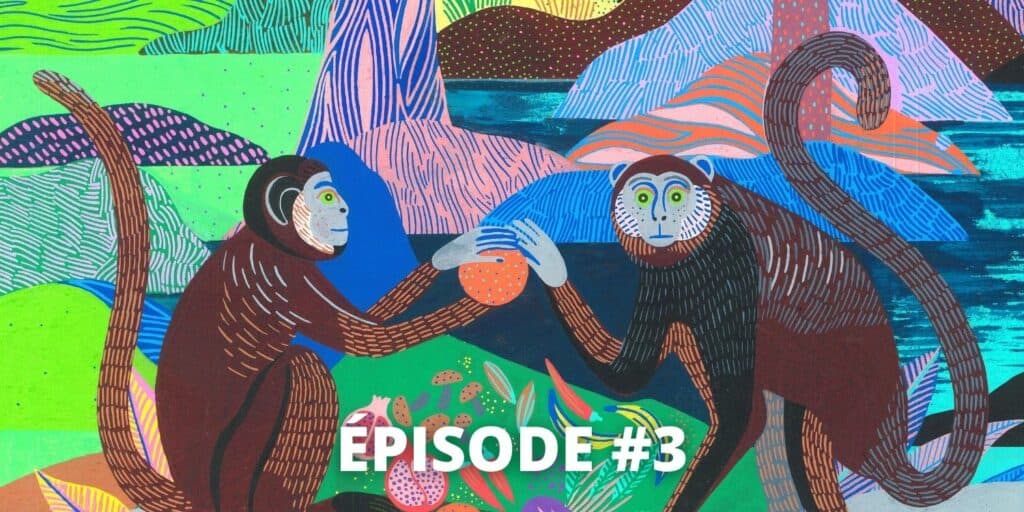Listen to the podcast
Subscribe to (R)évolutions Alimentaires!
Follow us on
The Benefits of Herbal Teas
For the third edition of the podcast produced by Darwin Nutrition, (R)évolutions alimentaires, we will talk about plants, herbalism, and herbal teas.
A somewhat witchy theme that is very dear to me!
As far back as I can remember, I’ve concocted magical potions. In the past, I would pick mint and melissa in my parents’ garden. Today, I still gather a sprig of sage, rosemary, lavender, heather, or yarrow wherever I go.
In my kitchen, linden and hops dry in the fall. I marvel at the herb squares, with their medieval angles, and at the vegetable gardens where fragrant herbs join in, for the delight of our brews and the bees.
Today, I grow on my balcony oregano, mint, thyme, agastache, lovage, rosemary, basil, and verbena. I feel like when I slip these leaves into water, whether hot or cold, the fragrant drink becomes magical and my body retains the memory of this lively water.
We have been using plants for healing for millennia. Numerous civilizations bear witness to this, from Mesopotamia, Egypt, India with the famous Ayurvedic medicine, Native Americans, to China.
One of the most traditional forms of using plants is herbal tea. Unlike tea or coffee, most of them do not contain stimulants.
How to prepare them? With which ingredients? What are the thousand virtues of herbal tea? Which ailments to remedy? This is what we will explore, feel, and understand with our two guests today.
The Guests
Myriam Amchikak: Myriam is a trained naturopath. She has worked in herbalism and pharmacy before creating the herbalist shop Herbonata in Saint Germain en Laye, to democratize the use of medicinal plants. Today, Herbonata is a store and a website with over 4000 natural products – including hundreds of loose medicinal plants and spices.
Jean Maison: Jean has been established since 1976 in the Monédieres massif, in Corrèze. He started a harvester-producer activity at that time, certified by Nature et Progrès. He is currently the president of the Comptoir d’Herboristerie, specializing in the trade of medicinal and aromatic plants from organic farming and ecological harvesting, inspired by the French tradition of herbalism.
My Questions
- How did you become interested in herbalism and herbal tea?
- Why drink herbal tea? What are the main health benefits of herbal tea? (Particularly compared to plant-based capsules)
- How to make a successful herbal tea?
- What are the differences between loose and bagged herbal tea?
- Is there a difference between fresh and dried plants?
- How long does herbal tea last?
- What is the difference between an infusion, a decoction, and a maceration?
- When to drink herbal tea?
- What are the most local herbal teas?
- Where to gather and buy your herbal teas?
- What are the best health synergies between plants?
- Which herbal tea would you recommend to our listeners? One for those who are new to this field, and one for those more familiar with the subject?
- Which herbal tea(s) to boost immunity in these somewhat difficult times?
- Herbal tea tips for energy, sleep, digestion, relaxation, or improving mood?
- What is your favorite herbal tea, the one you drink every morning or offer to your dear friends?
- What would be your tips for our listeners to easily start with herbal tea and herbalism?
- What are your sources of inspiration (books, authors, etc.)?
Resources to Go Further
- The book by Jean Maison on thyme
- Comptoir de l’Herboristerie Website
- Herbonata Website
- Practical Phytotherapy Guide, Dr. Jean Michel Morel, Grancher Edition
- Proper use of healing plants, Jacques Fleurantin, Editions Ouest France
- Healing with vegetables, fruits, and grains, Dr. Jean Valnet, Le Livre de Poche Editions
The (R)evolutions in Food Podcasts are presented by Louise Browaeys
Agronomy engineer (AgroParisTech) with a specialization in nutrition, Louise has been working for ten years in the fields of agriculture, food, and ecology.
She is the author or co-author of several books on topics such as food, ecology, permaculture, and corporate social responsibility. Notably: “The Share of the Earth: Agriculture as Art” (Delachaux and Niestlé, 2014), “Everyday Permaculture” (Terre Vivante, 2018), “The Planetary Diet” (La Plage, 2020).



